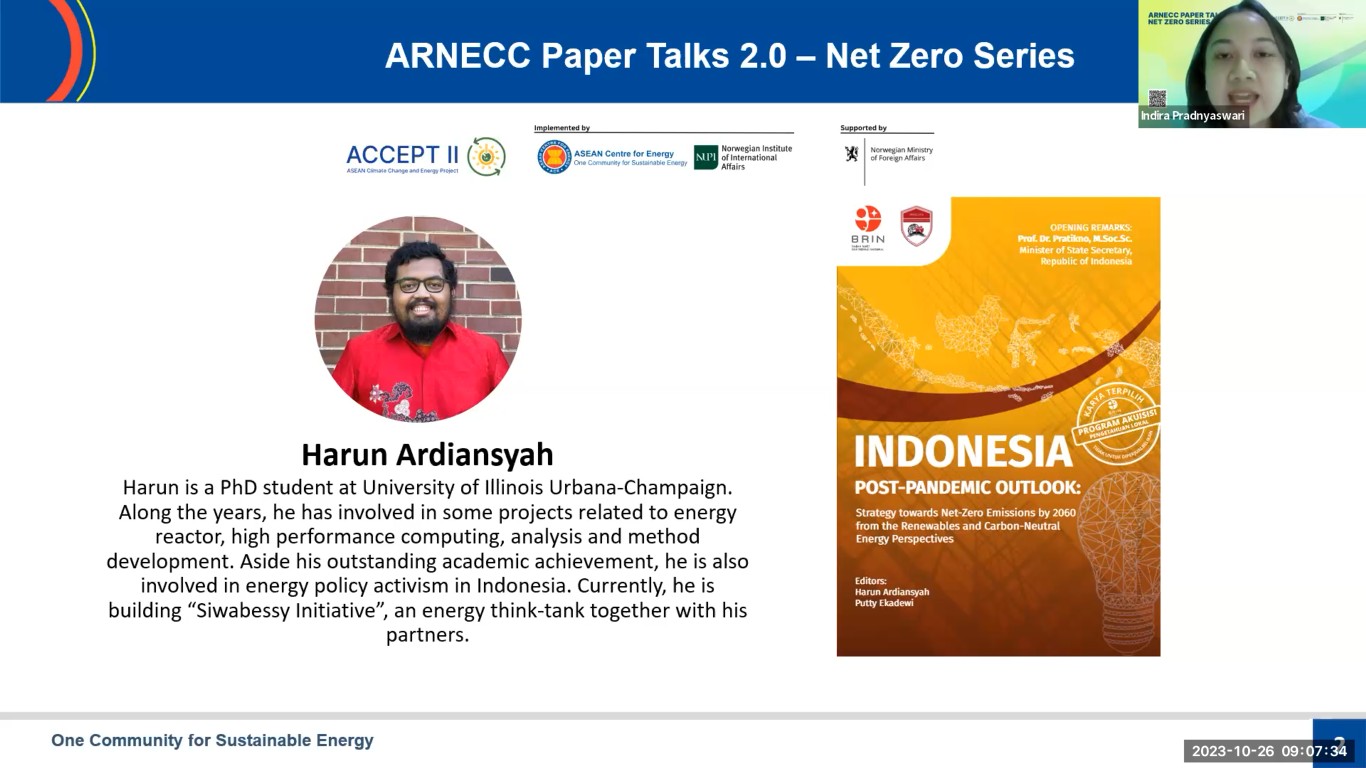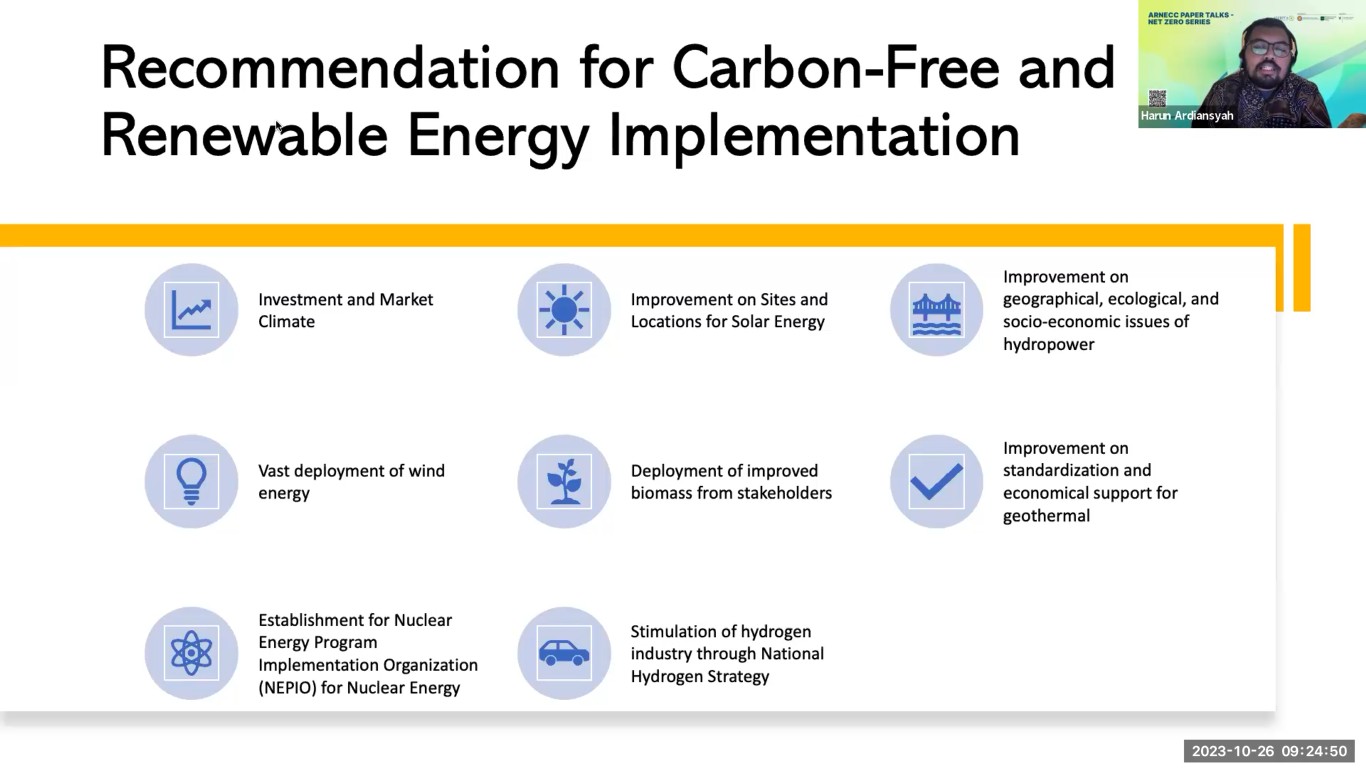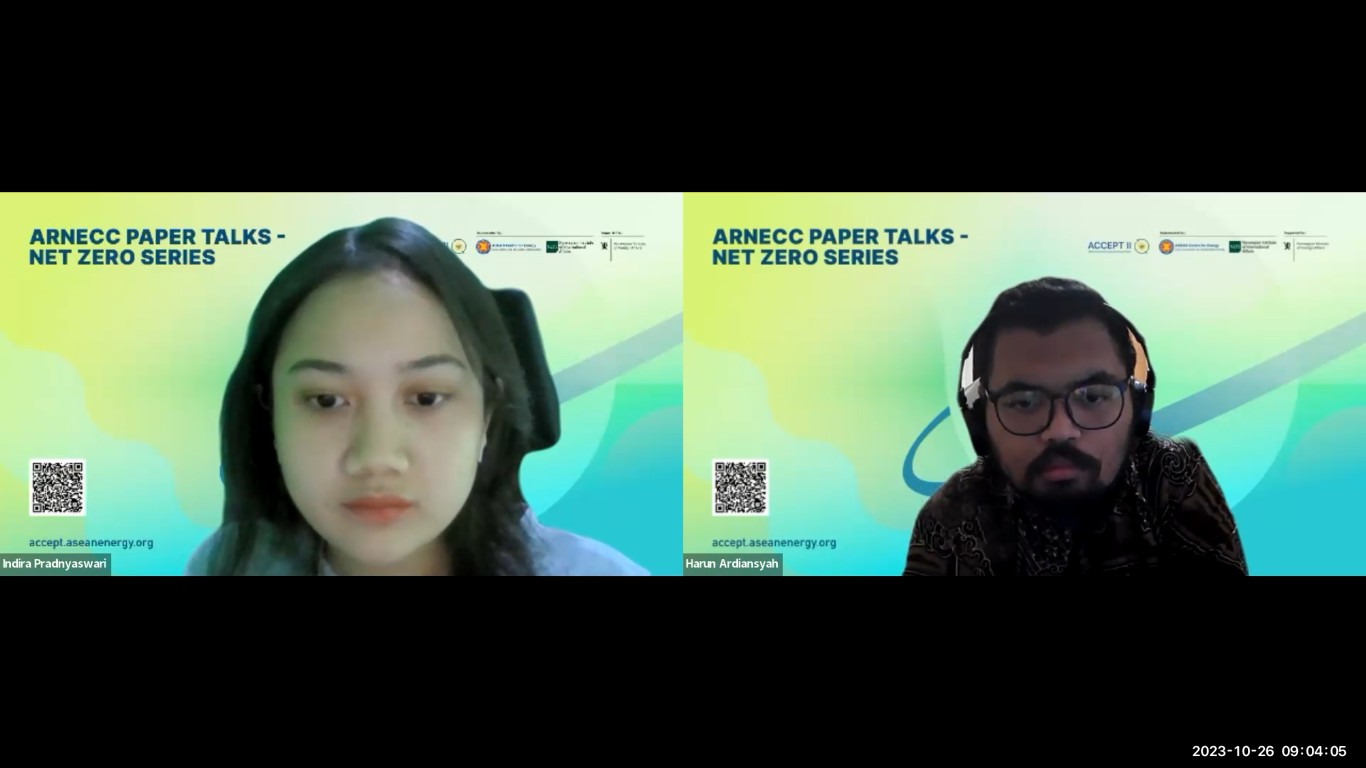i
i
Zoom, 26 October 2023
In pursuing ASEAN’s net zero future, ASEAN Climate Change and Energy Project (ACCEPT) Phase II takes immense pride in introducing the new season of our cross-country webinar series: ARNECC Paper Talk 2.0 – Net Zero Series. This inaugural episode, which took place on October 26, 2023, discussed the publication titled “Strategy towards Net-Zero Emission by 2060 from the Renewable and Carbon Neutral Energy Perspective,” presented by one of its authors, Mr. Harun Ardiansyah from the University of Illinois Urbana-Champaign with Ms. Indira Pradnyaswari, an ACCEPT Associate Research Analyst, as the moderator.

Photo 1. The introduction of the speaker by Ms. Indira Pradnyaswari as moderator
Indonesia’s journey towards achieving Net Zero Emission (NZE) targets combines progress and challenges. Mr. Harun discussed the evolution of Indonesia’s National Energy Policy, starting from its roots in 1981 to more recent milestones like the Presidential Regulation No. 22/2017 on the General National Energy Plan in 2017. Notably, the discussion highlights Indonesia’s commitments made at COP26 in Glasgow. The nation pledged to reduce carbon emissions and presented the Nationally Determined Contribution (NDC), outlining the roadmap for achieving low carbon emissions by 2050. Indonesia aims to incorporate 100% new and renewable energy (NRE) into its energy mix by 2060, with an aspiration for a zero-emission electricity sector by 2045. However, despite these commitments being ratified in regulations, the actual adoption of NRE still needs to be improved. Accounting for less than 20% of Indonesia’s energy mix up to 2020, this disparity calls for swift action.

Photo 2. Presentation by Mr. Harun Ardiansyah
Indonesia holds immense technological potential, including solar, hydropower, wind, biomass, geothermal, nuclear, and hydrogen energy. Bridging the gap between these technologies and the regulatory framework is the challenge. Mr. Harun advocates for a redefined understanding of “NRE” that focuses on carbon-free and renewable energy, excluding oil-based or carbon-based derivatives. To overcome these challenges, the study offers a set of recommendations. These include investing in carbon capture and offset technologies, offering incentives for low-carbon industries, streamlining the investment process for renewable energy projects, and enhancing public awareness about the importance of energy transition and carbon offset activities. Mr Harun concludes by emphasizing the need for a collaborative approach among various stakeholders as Indonesia progresses towards achieving Net Zero Emissions by 2060, recognizing the profound impact on society’s socio-economic aspects and underlining the necessity of prioritizing carbon-free and renewable energy in policymaking.
During the discussion, invaluable insights were exchanged regarding Indonesia’s path to achieving its Net Zero Emissions target. The discussion revolved around the pressing need for incentives in the energy transition process and the equally important consideration of the social cost of carbon (SCC). Mr. Harun emphasized the necessity of incentivizing the industry in Indonesia and suggested that carbon trading policies for coal-reliant industries should be reinforced to drive carbon reduction. The conversation also touched upon the potential of hydrogen as a clean energy source for transportation, aligning with Indonesia’s goals to decarbonize various sectors, including energy, industry, and transportation. Ms. Indira highlighted the insights shared in the 7th ASEAN Energy Outlook (AEO7), revealing a predominant carbon footprint from the energy, transportation, and agricultural sectors. This highlights the significance of Indonesia’s greenhouse gas production from the industrial sector, which will directly impact the broader ASEAN region.

Photo 3. Discussion session with Ms. Indira Pradnyaswari and Mr. Harun Ardiansyah
As the dialogue continued, the focus shifted to the evolution of Indonesia’s energy policy for NRE. Mr. Harun acknowledged significant policy improvements and incentives to reduce carbon emissions, highlighting the need for energy transition as a more central topic in government discussions. The session concluded with exploring the role of private sector involvement and the potential for decentralization in the energy market. Mr. Harun emphasized that while decentralization can be beneficial, its appropriateness must be assessed in Indonesia’s unique market dynamics. The discussion underscored the importance of policy reinforcement, technological adaptation, and cross-regional partnerships in Indonesia’s pathway for NZE. In closing, Mr. Harun emphasized the collective efforts required to raise awareness, formulate strategies, and advance the energy transition in Indonesia.
Indonesia’s path towards achieving its Net Zero Emission targets offers essential insights and valuable lessons that resonate with other ASEAN Member States (AMS) striving to realize their goals. It emphasizes the significance of developing dynamic and adaptable National Energy Policies enriched with regulatory frameworks and incentives that foster the growth of the new and renewable energy (NRE) sector. Furthermore, the Indonesian experience underscores the delicate equilibrium between centralized and decentralized energy markets. This highlights the need to transition to new energy sources while safeguarding energy security.
Challenges encountered by Indonesia, including the crucial role of incentives in energy transition and the consideration of the social cost of carbon (SCC), reflect common dilemmas throughout the ASEAN region. As a collective force, AMS can collaborate to devise strategies that address these challenges, harmonize their policies, and exchange best practices, thereby expediting the widespread adoption of NRE and carbon emissions reduction. This cooperative approach promises to propel the region closer to realizing Net Zero targets and, consequently, advance the shared goal of combating climate change.
Ms. Indira concluded the event by promoting ARNECC, which provides an interdisciplinary forum for discussing social, economic, governance, and technical issues related to energy and/or climate change. ARNECC links scholars, analysts, researchers, and other stakeholders across ASEAN to enhance broader knowledge and insights related to energy and climate change. Hence, it will improve the coherence between the ASEAN energy and climate policies and contribute to more climate-friendly development of the energy sector.
Join our ASEAN Researchers Network on Climate Change (ARNECC) by registering yourself here. Become a part of our collaborative efforts to address pressing climate challenges and shape a sustainable future.
Detailed information on ACCEPT II can be found at https://accept.aseanenergy.org/
We welcome any future collaboration, please feel free to contact us at [email protected]